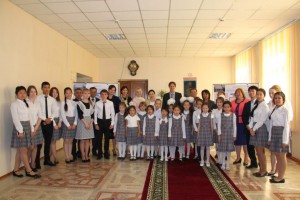ASTANA – The government of Kazakhstan, the UN Development Programme and the European Bank for Reconstruction and Development (EBRD) have completed a joint project to demonstrate the energy-saving possibilities of upgrading the Kazakh capital’s schools.  The project at public school No. 25, which was launched in 2011 and presented on Sept. 6, is expected to improve heating in classrooms, reduce the school’s annual heat consumption by more than one third per year and lower carbon dioxide emissions.
The project at public school No. 25, which was launched in 2011 and presented on Sept. 6, is expected to improve heating in classrooms, reduce the school’s annual heat consumption by more than one third per year and lower carbon dioxide emissions.
The project, funded by a grant of 160,000 euros from the EBRD in 2011 and organised with the help of the Kazakhstan Electricity Grid Operating Company (KEGOC), installed new insulation, energy-efficient windows and a modern, automated heating system in the school. The measures are expected to reduce the school’s energy consumption by some 1,566 gigajoules (GJ) per year, according to the EBRD, and save about $5,170 from the school’s annual energy bill. Rooms will be heated more evenly with the new system, and maintenance will be simpler, according to the EBRD.
The energy saving measures will also reduce the school’s carbon dioxide emissions by about 250 tonnes per year – one of the major reasons for undertaking the project. The grant was signed at the school in the context of the EBRD’s annual meeting of 2011, which was held in Astana. The grant was provided in order to offset the carbon footprint generated by the meeting and the air traffic it engendered, as well as to draw attention to environmental issues and energy efficiency.
“In addition to offsetting carbon emissions, we wanted to demonstrate that investment in energy efficiency is not just good for the environment, but makes good financial sense,” said Janet Heckman, EBRD director for Kazakhstan, according to an EBRD press release. “The school will save a lot of money on its energy bills – not to mention warmer, more comfortable rooms for deserving young people.”
All upgrades were done during the summer months, said UNDP Press Expert Dinara Abdrakhmanova, and the school, which serves students from ages 6 to 18, opened on time this year. The company that installed the heating system will service the school this year and collect data on its performance, which will be shared with other project experts, she said.
The project was implemented by the UNDP and the EBRD Astana Resident Office. The UNDP in Astana has had experience with similar projects over the last few years, including helping fund and implement a heating system renovation of school No. 9 in 2011. The organisation supports energy efficiency programmes in Almaty, Astana and Karaganda.
